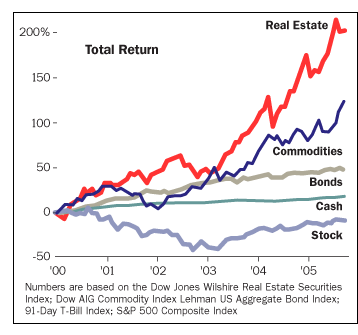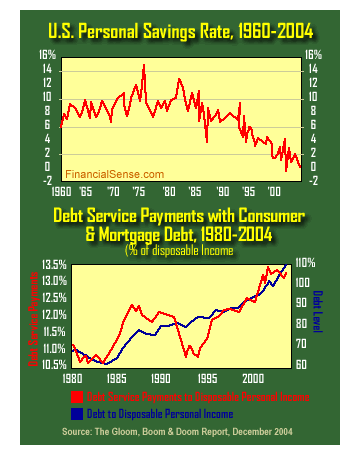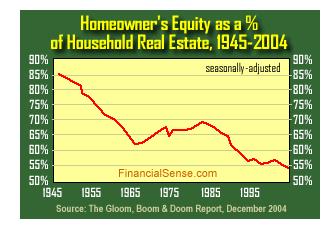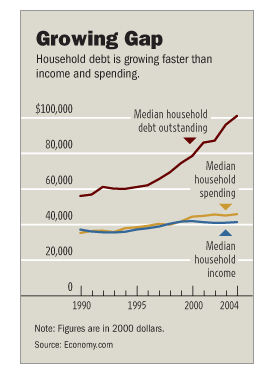

|
| weblog/wEssays archives | home | |
|
Housing Wealth Effect Shifts Into Reverse (May 2, 2006)  Everybody loves the Wealth Effect on the way up, but they forget that it also has a reverse
gear. We're about to rediscover that the Wealth Effect works just as well on the way down.
Everybody loves the Wealth Effect on the way up, but they forget that it also has a reverse
gear. We're about to rediscover that the Wealth Effect works just as well on the way down.
What's the Wealth Effect? Let's turn to the eerily familiar Bubble-topping month of December 1999 and the tireless rah-rah cheerleaders at BusinessWeek for an explanation: One theory economists are revisiting to help them understand the market's clout is the "wealth effect" that Nobel Prize winner Franco Modigliani postulated in the 1950s. Simplistically, his idea was that if wealth increases, people buy more; if it decreases, they buy less. If they buy a lot less, you get a recession, or worse. Modigliani's research showed that for every $1 of new wealth, people spend about five cents more and vice-versa. Ludvigson and Steindel's New York Fed study pegs the effect at three to four cents per dollar gained or lost. That sounds small, but figured on $10 trillion in U.S. household investments, it's $300 billion to $400 billion -- spending that could depress the economy if it suddenly disappeared.And disappear it did--and lo and behold, the nation did indeed slip into recession, albeit ever so briefly, as the mighty Federal Reserve lowered interest rates to 1% and cranked up the money machine. Other U.S. agencies did their bit as well by lowering credit standards so anyone with a job could get a mortgage without a down payment or even an application review. As noted here recently, according to the FDIC, only 74% of Americans have incomes above the poverty line, and 69.1% own a house. (The remaining 5% probably live in absurdly unaffordable locales like California which precludes them from buying.) All that easy credit, plentiful money, low interest rates--surprise--created a housing boom. No one is more delighted with the Wealth Effect than Realtors, of course, who are more than pleased to trumpet the fantastic money-machine created by rising home values: Housing Wealth Has Greater Effect Than Stocks, New Study Shows. To summarize: stocks rise and fall over relatively short periods of time, and hence the Wealth Effect is smaller than that created by housing, which rises and falls in much longer cycles. (Only the Realtors' report didn't mention that housing can fall. That would be akin to Galileo whispering under his breath, "But the Earth does orbit the Sun" while facing the Inquisition.) The Realtors' report also made rather smug mention of the fact that housing wealth is less concentrated than stock and bond wealth--a good point which we'll cover later. Other tidbits from the report include: 
According to the FDIC, In the first six years of this decade, the net increase of household wealth has been $5 trillion. Given the chart and data above, it is clear that the vast majority of that increase came in the form of housing equity. For a snapshot of what the housing Wealth Effect has wrought in the real world, let's turn to Newsweek's recent article entitled So Long to the Wealth Effect? The piece lists the following data on how much money has been pulled out of that newly minted housing wealth via re-financing or home equity lines of credit. (This is from the Federal Reserve, except for the 2005 estimate which comes from the FDIC.) YEAR | MONEY | SHARE OF DISPOSABLE PERSONAL INCOME 2000 | $204 bil. | 2.8% 2001 | 262 bil. | 3.5% 2002 | 398 bil. | 5.1% 2003 | 439 bil. | 5.4% 2004 | 599 bil. | 6.9% 2005 | 600 bil. (FDIC est.)($751 billion, US News & World Report )  Add this up and it seems Americans have pulled about $2.5 trillion out of their homes
in a mere five years--virtually half of the entire bubblicious rise in household assets.
According to the article, the Fed estimates that 2/3 or so of
this stupendous sum was spent. So let's say $2 trillion was spent (think drunken sailors
wandering through the inexplicable aisles of Ikea, etc.). That's a significant
percentage of consumer spending, and a significant drawdown on home equity.
Add this up and it seems Americans have pulled about $2.5 trillion out of their homes
in a mere five years--virtually half of the entire bubblicious rise in household assets.
According to the article, the Fed estimates that 2/3 or so of
this stupendous sum was spent. So let's say $2 trillion was spent (think drunken sailors
wandering through the inexplicable aisles of Ikea, etc.). That's a significant
percentage of consumer spending, and a significant drawdown on home equity.
Home equity now accounts for 38% of the average household’s net worth—up from 27% in 2000. This means that the wealth of most American households is now concentrated in their homes. But using "average houshold" is deceptive, for in reality the vast majority of assets are held by the top 10% of households, while the bottom 50% have virtually no wealth. Let's turn to the august Wall Street Journal for Wealthiest American Families Add To Their Share of U.S. Net Worth: The top 1% held 33.4% of the nation's net worth in 2004, up from 32.7% in 2001, but still lower than a peak of 34.6% in 1995. In 2004, the wealthiest 1 percent owned 70% of bonds, 51% of stocks and 62.3% of business assets.  So the top 10% of households own 70% of the nation's entire assets and the bottom 50% own
2.5%. The vast majority of the stocks and bonds are held by the top 10%. This is important,
because the rah-rah cheerleaders like to say that 50% of American families have
a stake in the stock market. What they fail to mention is the stake is roughly equivalent
to a $5 chip on a Las Vegas table with a $100 minimum bet.
So the top 10% of households own 70% of the nation's entire assets and the bottom 50% own
2.5%. The vast majority of the stocks and bonds are held by the top 10%. This is important,
because the rah-rah cheerleaders like to say that 50% of American families have
a stake in the stock market. What they fail to mention is the stake is roughly equivalent
to a $5 chip on a Las Vegas table with a $100 minimum bet.
In other words, the Wealth Effect of the recovered stock market is completely overestimated. Diane Swonk, deputy chief economist at Bank One in Chicago, argues that the stock market is "not a dominant factor and is very hard to use as a faucet you turn on and off. 52.2% of households don't have a dime" in the stock market, said Swonk.Here is the devastating conclusion which this data leads to: 70% of American households own a home, but 50% of households have virtually no wealth. What does that mean? It means 20% of homeowners are maxed out, borrowed to the hilt, with little or no home equity to their names despite being "homeowners." In fact, they own almost nothing and owe almost everything. Some simple math reveals that about 20 million homeowning households are extremely vulnerable to the reverse Wealth Effect. (75 million homeowners + 33 million renters = 108 million households. 50% of 108 M = 54 M with almost no assets. 54 M - 33 M renters = 21 M homeowners with little if any assets.) What happens to these 20 million homeowners once housing values decline and / or a recession kicks in? With no cushion in home equity or other assets, many will lose their homes. Yesterday, I may have shocked you by concluding that 5 million homes could go into foreclosure. Now, this number seems very conservative. And what happens to the home equity of the "middle class" (the 40% between the poor 50% and the wealthy 10%) when 5 to 10 million homes get sold at foreclosure auction? Their home's value drops like the proverbial stone. And what happens to consumer spending, which has been so heavily dependent on drawdowns of home equity? It too drops like the proverbial stone. That's called the Wealth Effect in reverse. As the above charts reveal, the rise in household assets since 2000 has been a chimera of borrowed money. Real wealth is the surplus capital accumulated by producing more than you consume--in simple terms, savings which are invested in productive assets. A house is not a productive asset, it is shelter and a repository of value only to the degree it can be profitably rented out as shelter. The Realtors--and the rest of us--are about to find out the Wealth Effect works not just on the rise but also on the fall. Scenarios for the Next U.S. Recession (FDIC report, March 23, 2006) Gary North's view of the FDIC report For more on this subject and a wide array of other topics, please visit my weblog. copyright © 2006 Charles Hugh Smith. All rights reserved in all media. I would be honored if you linked this wEssay to your site, or printed a copy for your own use. |
||
| weblog/wEssays | home |